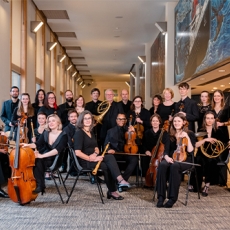Dunedin Consort - Handel: Ode for St Cecilia's Day - Early Music Review
Handel’s glorious paean to the patron saint of music has understandably been the subject of numerous recordings. Without claiming to have kept track of all of them, my loyalty has tended to remain with Trevor Pinnock’s 1985 recording with Felicity Lott and Anthony Rolfe Johnson as outstanding soloists. Coming back to it yet again by way of comparing it with this version from John Butt, I was once again struck by the remarkable vitality and freshness it has retained over the three decades since it was issued.
Butt’s new recording represents a departure from his usual work with his Dunedin Consort insofar as it emanates from his artistic directorship of the 2018 Misteria Paschalia Festival held in Kraków in Poland, an edition that made a special feature of music from Britain. As a mark of co-operation the choral section of the Dunedin’s is restricted to only two singers per part, who are supplemented by members of the Polish Radio Choir. They prove to be a responsive, well-balanced body who respond to Butt’s direction with enthusiasm, and whose English pronunciation and diction prove to be first class. One of the major pleasures of Butt’s performance is tempos that with one exception strike this listener as being ideally judged, avoiding the extremes that are presently so much a part and parcel of the performance of Baroque music. The exception comes with the soprano air ‘But oh! What art can teach’, which I feel Butt takes at a tempo that is marginally too stately and one that induces Carolyn Sampson to apply excessive vibrato, also a lesser problem with both singers elsewhere.
Elsewhere both she and Ian Bostridge contribute greatly to the success of the performance. Dryden’s wonderfully illustrative and mimetic text is ideally suited to Bostridge’s inimitable way with the English language and his singing of the opening accompagnato ‘When nature…’ and the stentorian air ‘The trumpet’s loud clangor’ are object lessons in communication. Sampson brings great sensitivity to the gentler, contrasting soprano airs, ‘The soft complaining flute’ in particular being enchantingly phrased and floated, the gentle trills expressing the ‘warbling lute’ beguilingly brought off.
In addition to the ode, the disc includes a very fine performance of the Concerto grosso, op. 6, no. 4, again notable for well-judged tempos, the beautifully played and shaped Largo e piano (iii) an object lesson in the right speed for an 18th-century largo. This is most certainly a recording to place alongside the long-serving Pinnock, its qualities further enhanced by notes from John Butt that manage to be both scholarly and eminently readable, an increasingly rare phenomenon.




